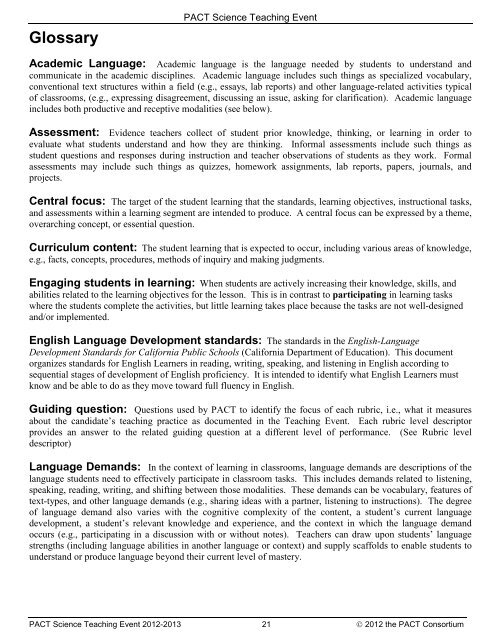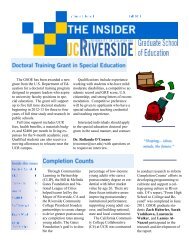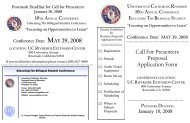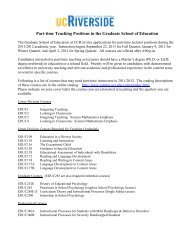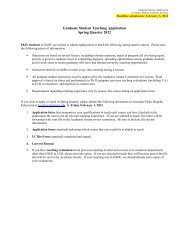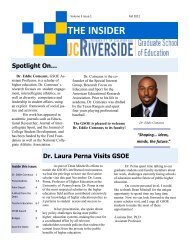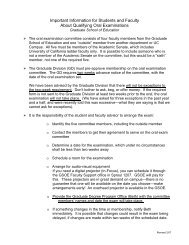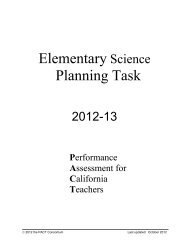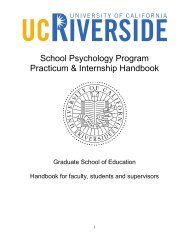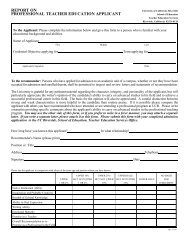Science Teaching Event - Graduate School of Education - University ...
Science Teaching Event - Graduate School of Education - University ...
Science Teaching Event - Graduate School of Education - University ...
You also want an ePaper? Increase the reach of your titles
YUMPU automatically turns print PDFs into web optimized ePapers that Google loves.
GlossaryPACT <strong>Science</strong> <strong>Teaching</strong> <strong>Event</strong>Academic Language: Academic language is the language needed by students to understand andcommunicate in the academic disciplines. Academic language includes such things as specialized vocabulary,conventional text structures within a field (e.g., essays, lab reports) and other language-related activities typical<strong>of</strong> classrooms, (e.g., expressing disagreement, discussing an issue, asking for clarification). Academic languageincludes both productive and receptive modalities (see below).Assessment: Evidence teachers collect <strong>of</strong> student prior knowledge, thinking, or learning in order toevaluate what students understand and how they are thinking. Informal assessments include such things asstudent questions and responses during instruction and teacher observations <strong>of</strong> students as they work. Formalassessments may include such things as quizzes, homework assignments, lab reports, papers, journals, andprojects.Central focus: The target <strong>of</strong> the student learning that the standards, learning objectives, instructional tasks,and assessments within a learning segment are intended to produce. A central focus can be expressed by a theme,overarching concept, or essential question.Curriculum content: The student learning that is expected to occur, including various areas <strong>of</strong> knowledge,e.g., facts, concepts, procedures, methods <strong>of</strong> inquiry and making judgments.Engaging students in learning: When students are actively increasing their knowledge, skills, andabilities related to the learning objectives for the lesson. This is in contrast to participating in learning taskswhere the students complete the activities, but little learning takes place because the tasks are not well-designedand/or implemented.English Language Development standards: The standards in the English-LanguageDevelopment Standards for California Public <strong>School</strong>s (California Department <strong>of</strong> <strong>Education</strong>). This documentorganizes standards for English Learners in reading, writing, speaking, and listening in English according tosequential stages <strong>of</strong> development <strong>of</strong> English pr<strong>of</strong>iciency. It is intended to identify what English Learners mustknow and be able to do as they move toward full fluency in English.Guiding question: Questions used by PACT to identify the focus <strong>of</strong> each rubric, i.e., what it measuresabout the candidate’s teaching practice as documented in the <strong>Teaching</strong> <strong>Event</strong>. Each rubric level descriptorprovides an answer to the related guiding question at a different level <strong>of</strong> performance. (See Rubric leveldescriptor)Language Demands: In the context <strong>of</strong> learning in classrooms, language demands are descriptions <strong>of</strong> thelanguage students need to effectively participate in classroom tasks. This includes demands related to listening,speaking, reading, writing, and shifting between those modalities. These demands can be vocabulary, features <strong>of</strong>text-types, and other language demands (e.g., sharing ideas with a partner, listening to instructions). The degree<strong>of</strong> language demand also varies with the cognitive complexity <strong>of</strong> the content, a student’s current languagedevelopment, a student’s relevant knowledge and experience, and the context in which the language demandoccurs (e.g., participating in a discussion with or without notes). Teachers can draw upon students’ languagestrengths (including language abilities in another language or context) and supply scaffolds to enable students tounderstand or produce language beyond their current level <strong>of</strong> mastery.PACT <strong>Science</strong> <strong>Teaching</strong> <strong>Event</strong> 2012-2013 21 © 2012 the PACT Consortium


